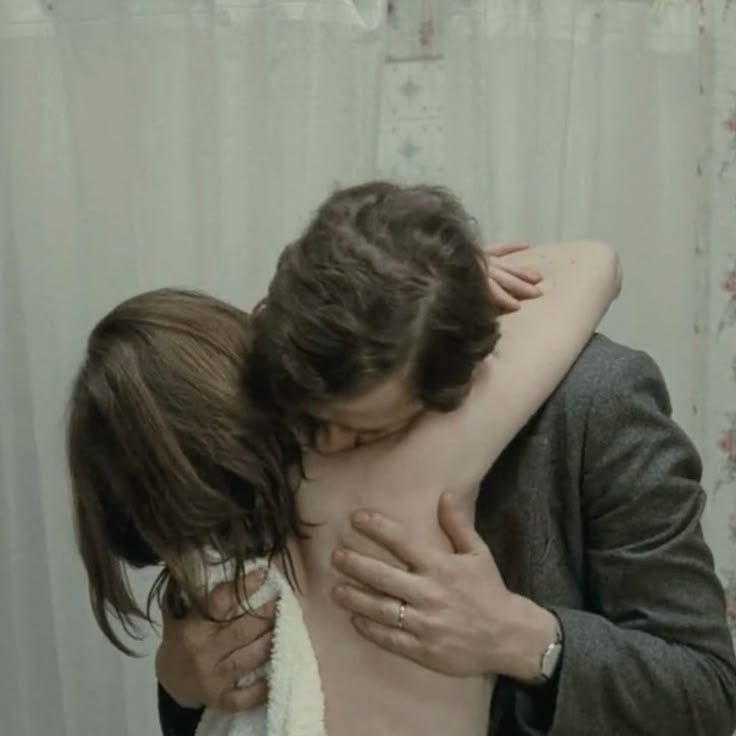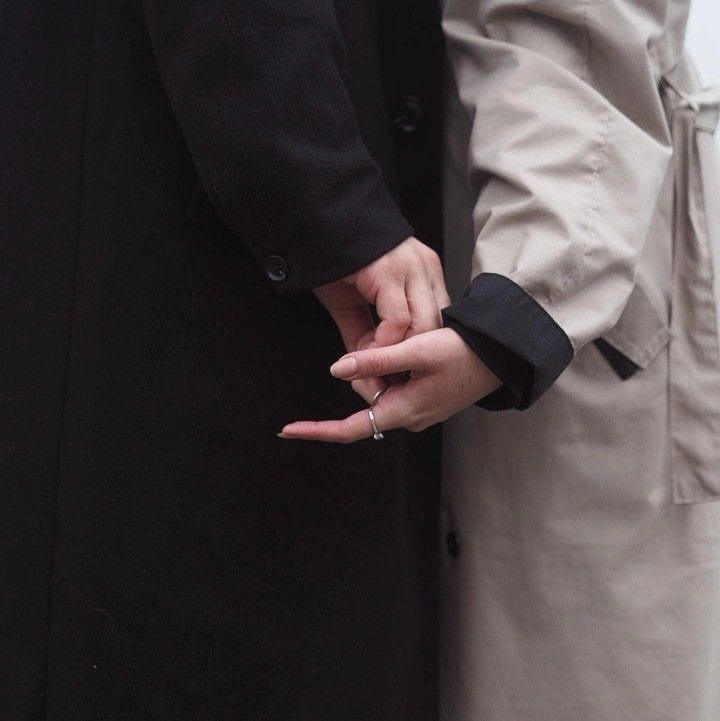hello.
the love that lingers the longest is often the one that never had a chance to begin. no first dates, no fights, no mornings where you realize you’ve stopped trying. it never had to survive the slow decay of closeness. there was no unraveling, because there was nothing to unravel. and instead, it lives inside you like something preserved. sealed off, untouched, impossible to kill. a perfect idea, unsullied by reality.
i’ve been alone almost my entire life. not in a self-pitying way, but rather, by default. i’ve never been in love. i’ve never had a real relationship. and if i’m honest, it’s partly because i’m constantly avoiding it. i’d rather be alone than experience the ache of unrequited love. even the idea of wanting someone who doesn’t want me back feels unbearable. so instead, i keep my distance. i tell myself i’m just independent and introverted. that i love my solitude, which is true, i really do. but i think i’ve also used it as a way to avoid being vulnerable.
i’ve realized how quietly masochistic that’s become. how much i’ve taught myself to fear intimacy before it ever had a chance to exist. it’s easier to build a life around not needing anyone than to risk the humiliation of needing and being met with silence.
and when the possibility of connection does appear, i never quite know how to behave. it’s like something short circuits.
is my autism showing?
i go quiet and retreat into myself. i don’t think people know what to do with me. i don’t know what to do with me. i become unknowable in the moments where i most want to be seen.
and maybe that’s the loneliest part. not the absence of love, but the feeling that even if it showed up, i wouldn’t know how to let it in.
but we’re human. and humans aren’t meant to be alone. even as an introvert and as someone who genuinely enjoys her own space. i still want to share it. i want my alone time, yes, but i want it with my best friend. someone who understands the rhythm of my silence and doesn’t need to fill the quiet, just exist it in with me.
and maybe that’s the paradox. i want closeness, but i’ve built a life designed to keep it at bay. i want to be known, but only from a distance. it’s safer to imagine connection than to risk the kind that might disappoint me.
maybe that’s why unrequited love feels so potent to me. not because i’ve lived it in a traditional sense, but because i’ve lived adjacent to it for years. i’ve constructed a life designed to avoid that kind of pain, and in doing so, i’ve also kept myself from real connection.
(this post is free, but if you enjoy this newsletter, consider becoming a paid subscriber and be part of a smaller circle where things feel a little softer, a little more personal, you’ll get early access to my youtube videos and a weekly media consumption roundup filled with articles, video essays, podcasts, and other references to make you smarter. i’d love to have you there)
truly, your support means the world to me and it’s what gives me the capacity to write to you.


it’s strange to me how easy it is to romanticize what we’ve never actually had. to protect ourselves from love by obsessing over the version of it that asks nothing from us.
unrequited love is precise in a way real love never is. it doesn’t interrupt your day or leave socks on the floor. it doesn’t ask you to bend or make room or stay through the boring parts. and it doesn’t fail you because it never got the chance. it just exists, clean and glowing, tucked behind everything else like a shrine and it starts to feel holy. safe. sometimes even more real than the relationships you actually have.
and maybe that’s why so many of us are clinging to it. not just the memory of someone, but the idea of what it means to long. because longing feels like proof of feeling and being alive. in a culture where we’re more connected than ever but also lonelier than we’ve ever been, unrequited love becomes a kind of coping mechanism. it lets you feel deeply without having to be vulnerable. it keeps you tethered to intensity and narrative without the mess of being seen or the risk of being let down.
we’re living in a loneliness epidemic. we don’t have infrastructure for intimacy anymore. fewer people have close friendships. fewer people date. fewer people know what it feels like to be held and truly understood. so instead, we fall in love with distance and fantasy and with people who will never get close enough to disappoint us. it’s safer that way. and more and more, we confuse safety with meaning.
and that’s what makes unrequited love so dangerous. nothing real ever got in the way. no truth to interrupt the fantasy or anyone to contradict the illusion. just a feeling, polished by silence, made sacred by its distance. it becomes the perfect story precisely because it never had to become anything else.
in a world where connection feels increasingly out of reach, unrequited love offers a strange kind of relief. it doesn’t require mutual vulnerability. it gives you something to orbit and something to narrate. in the absence of real intimacy, we become devoted to the imagined kind. and we convince ourselves that longing is just as good as love.
the person you loved stays exactly as you need them to be. beautiful, distant, unfinished. and so do you. you get to remain ideal too. you never have to make room for their fears, their pettiness, their boredom. you never have to reveal yours. unrequited love allows both of you to stay fictional.
and that’s what makes it seductive. not just the ache, but the control. the story remains yours to shape. untouched by reality, untouched by them. it doesn’t end because it never began. it doesn’t break because it was never held.
plato writes in the symposium that love is a kind of divine madness. a holy disorientation sent by the gods. we love not because we are fulfilled, but because we are fractured. and this is the fracture that makes us reach, the wound that makes us imagine the whole.
in his vision, the lover is not chasing a person, but an ideal. beauty, truth, completion—always just beyond the visible world. love, then, is not about having. it is about hunger. it is a condition of perpetual motion and a longing that lifts you out of yourself but never lets you arrive. it elevates you by withholding. thus the ache becomes the engine.
and maybe it’s not the love that feels profound, but the ache itself. maybe what we’re drawn to isn’t the person, or even the possibility of them, but the shape the wanting gives our lives. desire becomes structure. fantasy becomes meaning. and in a world that feels increasingly unstable, we begin to confuse longing with purpose.
longing is dependable. it keeps you occupied. it keeps you suspended in becoming. and becoming feels like progress, even when it’s not.
you start to believe the ache means something and that the absence is sacred. because as long as the love is unreturned, it stays pure. it doesn’t demand compromise or humility. it doesn’t ask you to change or stay. it just asks you to want.
to love without being loved in return is to remain suspended in a kind of becoming. and when becoming is all you’ve ever known, it starts to feel like meaning.
but maybe it isn’t love, maybe it’s architecture. maybe what we fall in love with is the space they leave behind, the outline we fill. unrequited love isn’t interactive. it doesn’t involve two people. it’s one person, alone, creating the entire narrative and a performance mistaken for connection. a god built from silence, answering only in your own voice.
roland barthes writes in a lover’s discourse that “the loved being is ungraspable, constantly out of reach: a mirage, a phantom.” to love someone who doesn’t love you back is to fall in love not with a person, but with the idea of love itself. and ideas are easier to worship. they don’t speak out of turn. they don’t contradict your fantasy because there’s no friction or interruption. no reality to complicate the myth.


barthes understood that unrequited love is less a relationship than a discourse. a loop of signs, interpretations, imagined cues. the lover reads meaning into silences. a glance becomes a sentence. a delay becomes suspense. everything is coded, everything is significant. you are no longer relating to someone because you are narrating them and constructing them through the grammar of your own desire.
and that narration becomes the point. the loved being never has to appear because they never have to speak. they just have to remain symbolic. because as soon as they step out of the frame and into their full, ordinary self, the entire system collapses.
when someone loves us back, we lose the script. we have to stop interpreting and start relating. we have to let them be real and let them disappoint us, contradict us, and come closer than we want. we have to meet them in the mess. real love demands attention, not projection. presence, not poetry.
and that’s harder. it requires dismantling the language we’ve built around our own desire. it requires being known, not just imagined.
but there’s a point where the ache stops being romantic and becomes something else entirely. a habit and a hiding place. a self-imposed exile disguised as depth. we start to believe we’re being faithful to some higher love, when really, we’re just afraid of being seen.
and it can feel transcendent. holy, even. clarice lispector once wrote, “i only achieve simplicity with enormous effort.” this kind of love is the same. from the outside, it looks simple. one loves, the other doesn’t. but inside, it’s a labyrinth. recursive, obsessive, tender and deranged. you can spend years trying to undo a glance. a passing word. you can build a whole religion out of a maybe.
because unrequited love isn’t passive. it’s spiritual labor and it demands constant translation, attention, self-surveillance. it becomes a private language, spoken fluently by one. and the danger is not just in the longing itself, but in what that longing replaces.
you begin to orient your entire inner world around absence and call it devotion, but it is often just a very beautiful way to disappear. lispector understood this. her characters are always circling something they cannot touch, and in the process, unraveling the boundaries of who they are. not being loved back doesn't just hurt, it destabilizes the self.
the truth is, you can only stay in the dream for so long before it starts to hurt more than it helps. at some point, the fantasy begins to feed on you. it stops being a refuge and becomes a form of self-abandonment. you become so loyal to the idea of them, of what could have been, that you forget yourself. your needs shrink. your future blurs. you pour all your light into a place that cannot hold it.


simone weil said that “attention is the rarest and purest form of generosity.” what would happen if you turned that attention inward? what if you stopped offering it like a gift to someone who isn’t even here? what if the fantasy was never really about them at all, but about the version of yourself you got to be in their absence. intense, poetic, unruined?
you don’t need to stop loving them.
love doesn’t work like that. it isn’t a faucet you shut off, but you can stop building a life around their silence. you can let the fantasy die, and still honor the part of you that dreamed it.
maybe that’s what real love is. not the ache, not the performance, or the ghost you keep trying to resurrect, but the quiet decision to stay with yourself. to resist the impulse to vanish. to choose presence over projection. to become the one who stays.
because that absence you keep mourning? it’s also an opening.
and something new can begin there.
not with them.
with you.
if you're still living in the ache, these are the books that might understand:
the passion by jeanette winterson
a soldier falls in love with a woman who doesn’t love him back, and instead of moving on, turns that love into a kind of myth. it’s about obsession, war, gender, and devotion that becomes its own religion.
the sea, the sea by iris murdoch
an aging man retreats to the coast, only to become obsessed with a woman he once loved who is now married, uninterested, and unreachable. but that doesn't stop him. the novel descends into psychological chaos as he tries to possess her memory and manipulate her presence. it’s about the narcissism of obsession disguised as romance.
the symposium by plato
love as divine madness. a philosophical dialogue that treats longing as holy, sacred, and inherently incomplete. love becomes not a destination, but a striving, always reaching, never arriving. unrequited by design.
a breath of life by clarice lispector
written as a conversation between an author and his creation — or maybe just between a woman and herself. it’s not about unrequited love in the traditional sense, but about the impossible intimacy of being known. raw, fractured, and full of longing for a kind of union that language keeps failing to deliver.
le ravissement de lol v. stein by marguerite duras
a woman watches her fiancé fall in love with another woman and doesn’t react. years later, she becomes obsessed with the couple and begins reenacting the trauma. duras writes longing like it’s a trance. dissociative, ambient, and quietly deranged.
good morning, midnight by jean rhys
a woman wanders through paris, clinging to the memory of a life that no longer wants her. the love is gone, but she performs desire anyway. bleak, glamorous, and quietly brutal.
a lover’s discourse by roland barthes
not a novel, but a taxonomy of longing. fragments on waiting, fantasizing, idealizing, narrating. it’s the internal monologue of someone who lives inside the love story no one else knows is happening.
we have always lived in the castle by shirley jackson
not romantic, but deeply unrequited. merricat’s obsessive love for her sister is singular, isolating, ritualistic. this is what it looks like when devotion becomes delusion, when no one else can exist inside your fantasy but you.
the vet’s daughter by barbara comyns
a lonely, unloved girl in an oppressive victorian household discovers she can float. the floating is never explained. it’s a metaphor, a rebellion, a last resort. strange, gothic, and painfully tender.
okay, that’s all for today.
if you’re not ready to become a paid subscriber and you have the capacity to leave a tip, that would be so appreciated.
i love you.
bye.
(follow ig, tiktok, youtube, pinterest and spotify for more)





“the truth is, you can only stay in the dream for so long before it starts to hurt more than it helps. at some point, the fantasy begins to feed on you” - so beautifully put :)
You read me for filth with this one I must say.